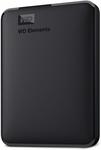I have been looking for a new Hard Drive and found this today. Best I can find at the moment for a WD 4TB Hard drive. listed for $149 on Amazon Australia. Office works has a similar WD Elements Hard Drive 4TB for $179 that is listed as a school list item. So for parents that have a School list you may be able to get 20% off the $149 price match offer bringing the price down to $119.20 (under $30 per TB). Anyone else you can still get 5% off bringing it down to $141.55. I was able to get the price match to $141.55 as I don't have an official back to School list. Here is a link to the office works page but you need to go in store for the price match. Its not an exact same product code but the store I went to honoured it anyway, so goodluck worth a try. I am first time OP so I hope I did ok.
https://www.officeworks.com.au/shop/officeworks/p/wd-4tb-ele…
WD 4TB Elements Portable Hard Drive $149 Delivered @ Amazon AU ($141.55 Pricematched at Officeworks)
Last edited 10/01/2019 - 18:03 by 1 other user
 CamelCamelCamel.
CamelCamelCamel.Related Stores
closed Comments

Jeez can anyone else comment on fragile please.
I’m about to buy this

I've got a few of these and never had any issues. I usually buy a $5 case from ebay which protects it in case you accidentally drop it on tiles or other hard surfaces.

Oh so like a shock absorber?

Reading comments on other posts, people seem to rate the WD ones over Seagate?

Nope, WD is worse than Seagate since they use hardware encryption and a direct soldered connection; they aren't shuckable.
Seagate drives use a removable connector and aren't hardware encrypted, which means if the connector dies but not the drive itself (which is very common with portable drives) you can remove the drive and recover your drive, whereas you can't remove the WD drive, and even if you do, you'll need to unsolder the connector, resolder a new one and since it's hardware encrypted you won't be able to read your data anyway.
It's internal drives that people prefer WD to Seagate on, as WD drives are more expensive, slower and have a higher failure rate (using backblaze figures, not "I had a Seagate and it died but my WD didn't so Seagate is bad") but produce less heat and noise (due to the slower speed, 5400RPM vs 7200RPM) and are cheaper if you shuck, as certain portable drives (such as the WD My Book, but not this portable drive) are shuckable.
Tl;dr: In the case of portable drives, Seagate are undeniably better. In the case of internal, it depends on if you'd prefer faster with more heat and noise or slower with less heat and noise.

Just as an addendum to the backblaze figures people always quote.
backblaze always buys the cheapest drives; everybody does.
So their stats will be something like 80 thousand seagate drives tested 6% failure rate
WD drives - 2 thousand tested 3% failure rate.If you know anything about statistics at all - it 100% means that you cannot glean anything with testing numbers like this.
When WD drives were cheaper 5 or 10 years ago the numbers were flipped - They tested way more WD drives and their failure rates were higher.
PPS - Someone is also going to quote how seagate made a 3tb drive where failure was 30% - yes we all know; seagate made that 1 dud drive. Every brand has done that too at least once in their history. Just dont buy that one.

Just to add onto what you said:
Q3 2018: They used 2 models of WD drives, the one with the highest failure rate, the WD RED 6TB had a 4.64% failure rate with 383 drives. That's the highest failure rate of any drive that suffered failures in Q3.
Backblaze literally only tests WD RED drives from what I've seen recently. WD RED drives are THE sought after WD drive that I was referring to as an internal drive, and was comparing against the barracuda.
The Barracuda in comparison, out of the 6 Seagate drives they used, the one with the highest failure rate was the Seagate Barracuda 4TB, with a 2.28% failure rate.
These numbers aren't completely accurate due to the difference in the number of drives used in each model, but paints a good overview.
WD drives aren't necessarily bad, they have strong and weak points when comparing the Red WD drives to the Barracuda Seagate drives. I personally use mainly WD RED drives (I've got 15 8TB ones, planning on 10 more 10TB ones) because I have everything backed up anyway, and I can get WD RED drives at $15 cheaper per TB, so even though they are slower than the Barracuda, they're cheaper for me and produce less heat and noise. For the majority of people though, Barracuda drives would be cheaper and so worth considering instead due to the cheaper price and faster speed, unless you significantly value lower heat and noise.
I agree that the numbers backblaze gives can't be trusted 100%, but they're the most reliable numbers that currently exist.

Not the same drives.
Amazon is Elements, OW is Elements SE.

The person I was served by checked with the manager and they honoured it.

So meaning it's discretionary and you just got lucky.

possibly but worth a shot especially if anyone has it on their kids back to school list

yesterday I tried to pricematch at Officeworks. Not allowed because different models.

Whats the difference between Elements and Elements SE?

For starters, the case is different from the photos.

The WD Elements Portable and the WD Elements SE Portable are very similar drives. Both drives are connected to a PC using USB power. However, each drive uses a different type of USB cable in order to make this connection.
The WD Elements Portable uses a USB Mini cable.The WD Elements Portable SE uses a USB Micro cable.

any opinions on elements vs passport?

yes please i'd like to know too!





these are really fragile bought one off amazon deal last month dropped it once and doesn't work now